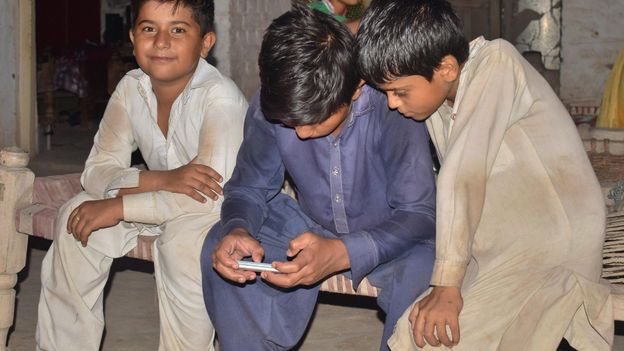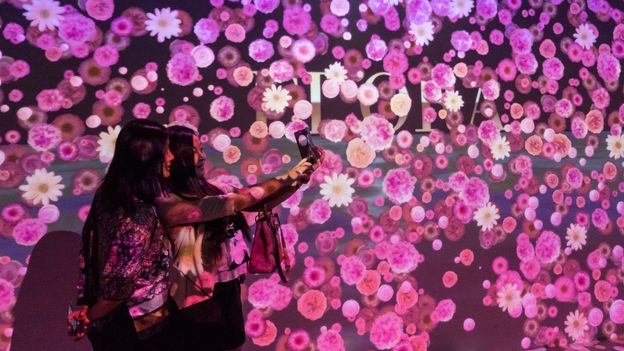“The youth think that agriculture and farming is outdated, and are even abandoning their parents’ and grandparents’ land,” she explains. “If we make it more high-tech, we can promote the youth into that business.” GroHydro systems are also being designed for refugees in Ethiopia’s urban centres who are often marginalised. Not only does this empower refugees with an income, but Wondim hopes that through business a dialogue will be created between refugees and Ethiopians. “We need to start some kind of engagement,” she says.
Ethiopia’s society is highly communal. Injera – a traditional flatbread eaten with most meals – is always shared from the same plate, while coffee is drunk together several times a day. Such social norms influence the tech solutions being developed in Addis Ababa.
Lemma points to a traditional crowd-saving practice – called Equb – in which family members and friends regularly put money into a shared pot, and then wait their turn for the dividends. Recently this Ethiopian custom has been digitised into a mobile app. “You wouldn’t think about this in another market, unless you had that culture,” he says.
Investors needed
While Addis Ababa is teeming with innovative ideas like these, turning them into marketable products is an uphill struggle. For decades, Ethiopia’s business environment has remained conservative and bureaucratic. “Commercialisation for any business here is hard, but if you’re looking at tech innovation, it’s way harder,” says Lemma. The procedure to open or close a new business is lengthy and expensive – the antithesis of the start-up model.
Yet Abiy has indicated reforms are on the horizon. In December, he launched the ‘Doing Business Initiative’, which aims to lower the regulatory and administrative hurdles for businesses and promote investment.
Foreign investment in Ethiopia is currently tightly controlled, hampering many of its budding start-ups. On a chalkboard scrawled with aspirations at blueMoon there is one common thread: “I want to meet investors”.
And while internet access has leapt in recent years, the telecoms sector – which state-owned Ethio Telecom has a monopoly on – is notoriously expensive and unreliable. Under the previous government, nationwide internet blackouts were common as the state shut down communications in the face of widespread protests and ethnic violence.
Internet blackouts are a thing of the past since Abiy came to power. He’s also opening up to foreign investment, with Ethio Telecom set to be partially privatised and split into two competing businesses as a first step. In February, he told the Financial Times: “My economic model is capitalism.”
Yet the rapid liberalisation of Ethiopia’s economy carries with it the risk of neo-colonialism. Getnet Assefa, the co-founder of iCog Labs and an ardent support of many of Abiy’s reforms notes that most of the technology companies in Kenya and Nigeria are foreign-owned. “Yes, they have a lot of investment,” he says. “But if you look at it in terms of homegrown tech, Ethiopia is doing reasonably well.” Assefa believes the government must tread a line between encouraging foreign investment and fostering the growth of Ethiopian tech companies.
Nurturing ideas
In July, Abiy met with Sophia the Robot, who was partly built at iCog Labs. “We programmed Sophia to speak a small amount of Amharic for the prime minister,” says Assefa. As much as Abiy’s appearance was a publicity stunt, it signalled his commitment to the technology sector. “People are now seeing Ethiopia in a different eye, not just poverty and politics,” says Assefa.
Optimism abounds in Addis Ababa’s tech community, but Lemma cautions that many of Abiy’s proposed changes are yet to happen. “I really support his ideas and his ambition,” he says. “But on the flip side, this is all theoretical.”
In the meantime Lemma, Gabre-Madhin and others are nurturing the technology ecosystem themselves. Alongside incubators, they are creating workshops, mentor networks and funding opportunities. “We set out to do something very holistic,” says Gabre-Madhin.
In particular, there’s a need to connect university graduates to this technology ecosystem. In the last two decades, the number of universities in Ethiopia has increased from two to more than 40, while it’s mandatory government policy for 70% of university students to study science and engineering subjects.
“If you nurture this talent and provide a landing for all of this energy and passion, something good is going to come out of it,” says Gabre-Madhin. “The difference between where ideas thrive and where they die is the fertile ground on which they fall.”
—
To comment on this story or anything else you have seen on BBC Capital, please head over to our Facebook page or message us on Twitter.
If you liked this story, sign up for the weekly bbc.com features newsletter called “If You Only Read 6 Things This Week”. A handpicked selection of stories from BBC Future, Culture, Capital and Travel, delivered to your inbox every Friday.













